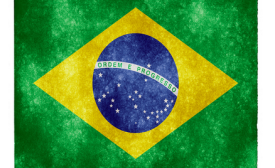digital diplomacy
Turks have hit back at a new law tightening control of the internet with more than half a million tweets on the hashtag "Internet Censorship in Turkey".
Google hasn't shied away in the past from taking political positions in its popular doodle images on its google.com homepage. Thursday's doodle is no exception. It features a rainbow-colored illustration of popular Winter Olympic sports, including alpine skiing, hockey, curling, and ice skating.
Each year the second year students in the USC Master of Public Diplomacy program select a location abroad to conduct new research that can further the study and practice of public diplomacy. This year, the Class of 2014 selected Sao Paulo, Brazil for its unique position in world politics. Brazil is currently transitioning from a regional and hemispheric power to a global one.
Judith Martin, the popular American columnist better known as “Miss Manners”, advocates restraint when responding to insults: “I don't believe in answering rudeness with rudeness”, she once said in an interview. In extreme circumstances, however, – such as when a man asks a woman whether she’s expecting – Martin does permit to “defend one’s own honor.”
On his first anniversary as secretary of state on Tuesday, John Kerry celebrated by reactivating his Twitter handle. “It only took a year but @StateDept finally let me have my own @Twitter account,” Mr. Kerry tweeted with the hashtag #JKTweetsAgain, as if to suggest he had been held hostage for the last year without a BlackBerry.

Each year the second year students in the USC Master of Public Diplomacy program select a location abroad to conduct new research that can further the study and practice of public diplomacy. This year, the Class of 2014 selected Sao Paulo, Brazil for its unique position in world politics. Brazil is currently transitioning from a regional and hemispheric power to a global one. The country will be on display during the 2014 FIFA World Cup and the 2016 Summer Olympics in Rio de Janeiro, and MPD students want to gain a better understanding of Brazilian public diplomacy practices.
YouTube temporarily suspended Australian prime minister Tony Abbott's account on Sunday after a message titled 'Delivering on Our Promises' was flagged by users. Though Google said in a statement that videos flagged by users are sometimes mistakenly taken down, many critics of Abbott's policies relished the removal, particularly for violating a policy against "spam, scams, and commercially deceptive content".
A popular online education platform has blocked its services from Cuba, Iran and Sudan to adhere to US sanctions on international trading. Coursera, the social entrepreneurship company to offer Massive Open Online Courses (MOOC), has more than 21 million student enrollments in over 180 countries. Coursera co-founder Andrew Ng told The Stream there have been thousands of failed attempts to login since the block was initiated last Friday.







